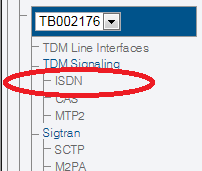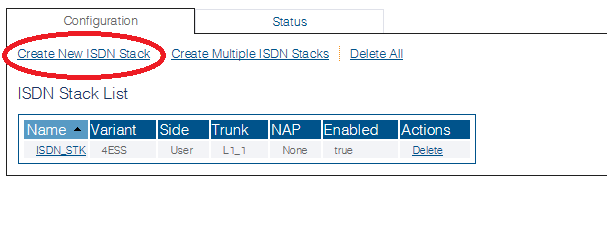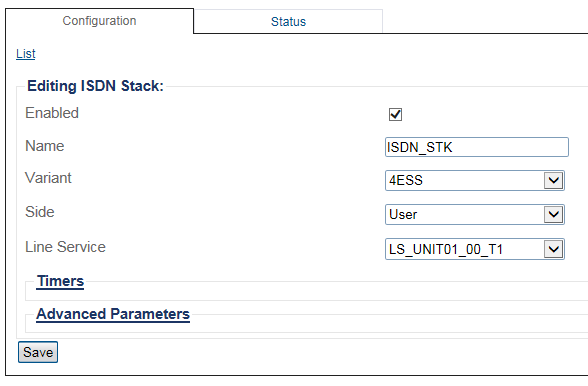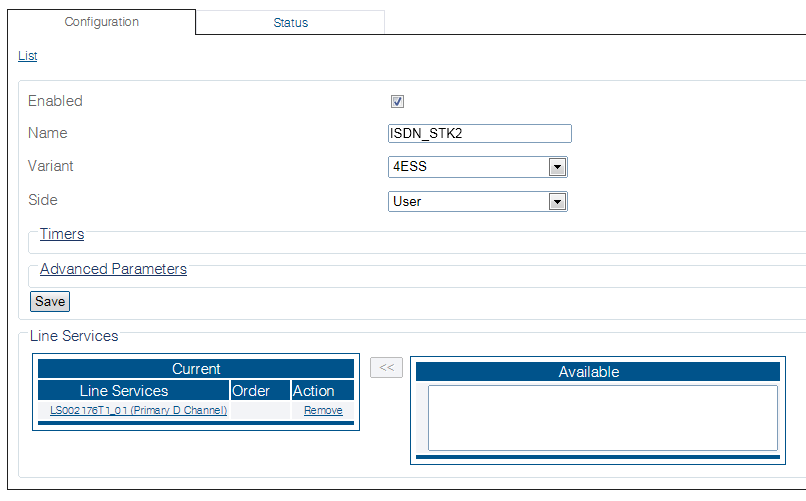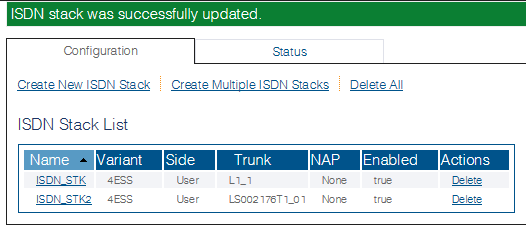Toolpack:Configuraing NFAS D
| (5 intermediate revisions by one user not shown) | |||
| Line 1: | Line 1: | ||
| − | |||
{{DISPLAYTITLE:Configure NFAS}} | {{DISPLAYTITLE:Configure NFAS}} | ||
| + | {| class="wikitable" | ||
| + | |- | ||
| + | |rowspan="2"|This article applies to: | ||
| + | |'''Product''' | ||
| + | |'''Version''' | ||
| + | |- | ||
| + | |Tmedia | ||
| + | |2.10, 3.0, 3.2 | ||
| + | |} | ||
| + | |||
ISDN-PRI signaling can be configured for your system. To do so, you must create a new ISDN stack. | ISDN-PRI signaling can be configured for your system. To do so, you must create a new ISDN stack. | ||
| − | Integrated Systems Digital Network (ISDN) is a circuit-switched telephone system that | + | Integrated Systems Digital Network (ISDN) is a circuit-switched telephone system that integrates voice and data on the same lines. Tmedia and Tdev systems can be configured to provide an ISDN signaling stack on the trunks of one or more units to meet your system configuration requirements. |
To create a new ISDN stack: | To create a new ISDN stack: | ||
| Line 11: | Line 20: | ||
[[Image:ISDN_NFAS_0.png]] | [[Image:ISDN_NFAS_0.png]] | ||
| − | |||
2- Click '''Create New ISDN Stack''' | 2- Click '''Create New ISDN Stack''' | ||
[[Image:ISDN_NFAS_1.png]] | [[Image:ISDN_NFAS_1.png]] | ||
| − | |||
3- Create the new stack: | 3- Create the new stack: | ||
| Line 26: | Line 33: | ||
* Select a '''variant''' to associate with the stack | * Select a '''variant''' to associate with the stack | ||
* Determine whether the stack will operate on the '''user side''', or the '''network side''' | * Determine whether the stack will operate on the '''user side''', or the '''network side''' | ||
| − | * Select a ''' | + | * Select a '''line service''' |
* Click '''Create''' | * Click '''Create''' | ||
| − | [[Image: | + | [[Image:Create_ISDN_Stack_2_a.png ]] |
| Line 121: | Line 128: | ||
</pre> | </pre> | ||
</div> | </div> | ||
| − | |||
==List of Parameters== | ==List of Parameters== | ||
Latest revision as of 13:09, 25 November 2020
| This article applies to: | Product | Version |
| Tmedia | 2.10, 3.0, 3.2 |
ISDN-PRI signaling can be configured for your system. To do so, you must create a new ISDN stack.
Integrated Systems Digital Network (ISDN) is a circuit-switched telephone system that integrates voice and data on the same lines. Tmedia and Tdev systems can be configured to provide an ISDN signaling stack on the trunks of one or more units to meet your system configuration requirements.
To create a new ISDN stack:
1- Click ISDN in the navigation menu, under the Signaling header
2- Click Create New ISDN Stack
3- Create the new stack:
Note: TelcoBridges offers several ISDN variants, four of which support NFAS. By clicking on 'Create' you confirm the line service and in the case of ISDN variants which support NFAS you are permitted to add additional line services.
- Verify that the box labeled Enabled is checked
- Enter a name for the new ISDN stack
- Select a variant to associate with the stack
- Determine whether the stack will operate on the user side, or the network side
- Select a line service
- Click Create
4- Verify that the "ISDN stack was successfully created" message appears
5- Create a backup line:
- Click on the Available line on the righthand side of the screen, and select the arrow to add it to the Current-Line Services. Up to 20 line services can be added in one NFAS group.
- Select the line service that will be used as a D-channel backup by this ISDN stack instance.
- Click Save
6- Verify that the "ISDN stack was successfully updated" message appears, and that the new trunk line is listed in the ISDN Stack List
Path
/configurations/@[configuration_name]/hardware_units/@[hardware_name]/isdn_stacks/@[isdn_stack]
Parameters (text)
/configurations/@[configuration_name]/hardware_units/@[hardware_name]/isdn_stacks/@[isdn_stack] dchannel_bkp_line_service = "" enabled = true line_services = [ "@[line_service_name]" ] name = "FNT01" side = "User" variant = "NET5" /configurations/@[configuration_name]/hardware_units/@[hardware_name]/isdn_stacks/@[isdn_stack]/advanced_parameters force_wake_up = false options = 0 /configurations/@[configuration_name]/hardware_units/@[hardware_name]/isdn_stacks/@[isdn_stack]/timers t301_timer = "3 minutes" t302_timer = "15 seconds" t303_timer = "4 seconds" t304_timer = "20 seconds" t305_timer = "30 seconds" t307_timer = "3 minutes" t308_timer = "4 seconds" t309_net5_timer = "6 seconds" t309_timer = "90 seconds" t310_network_timer = "10 seconds" t310_user_timer = "30 seconds" t313_timer = "4 seconds" t316_timer = "4 seconds"
Parameters (json)
{
"advanced_parameters" : {
"force_wake_up" : false,
"options" : 0
},
"dchannel_bkp_line_service" : "",
"enabled" : true,
"line_services" : [
"@[line_service_name]"
],
"name" : "@[isdn_stack]",
"side" : "User",
"timers" : {
"t301_timer" : "3 minutes",
"t302_timer" : "15 seconds",
"t303_timer" : "4 seconds",
"t304_timer" : "20 seconds",
"t305_timer" : "30 seconds",
"t307_timer" : "3 minutes",
"t308_timer" : "4 seconds",
"t309_net5_timer" : "6 seconds",
"t309_timer" : "90 seconds",
"t310_network_timer" : "10 seconds",
"t310_user_timer" : "30 seconds",
"t313_timer" : "4 seconds",
"t316_timer" : "4 seconds"
},
"variant" : "NET5"
}
List of Parameters
Advanced Parameters
